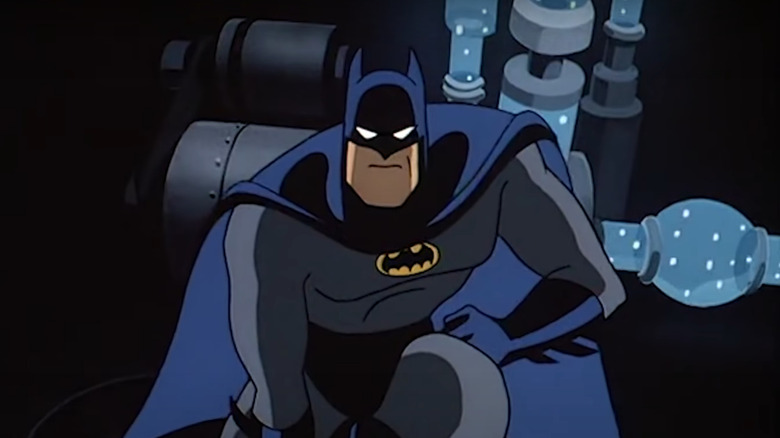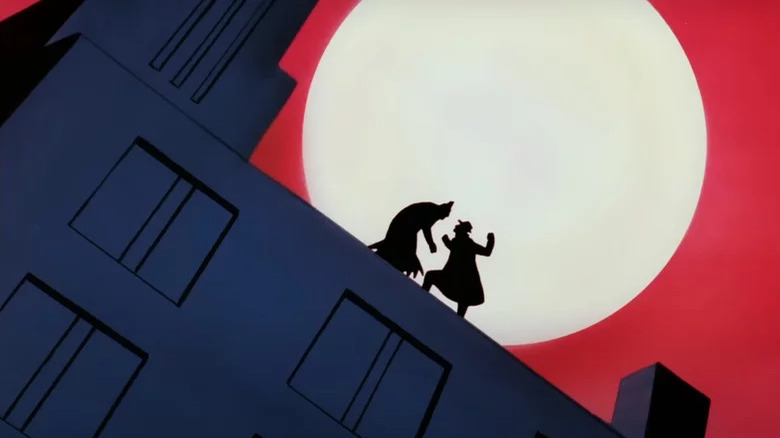Bruce Timm Had Two Classic Shows In Mind While Writing Batman: The Animated Series
"Batman: The Animated Series" may be a wholly original take on the Dark Knight but it's also indebted to numerous inspirations. Show co-creators Bruce Timm and Eric Radomski, along with writer Paul Dini, were keen to draw on not just the best of Batman's history, but cultural history in general. The goal was to produce a show that, as Dini told Syfy, depicted "a dark world, a world where crime really exists on every level." That approach would often cause them to run afoul of the Fox censors, who weren't enthusiastic about the show's mature tone. After all, this was a Fox Kids cartoon.
Thankfully, the team behind "Batman: TAS" were adept at navigating their way through the treacherous waters of Standards and Practices, maintaining their mature vision despite frequent pushback. And that extended beyond the usual stuff that gets censors riled up, such as violence or edgy language. The writers often managed to smuggle in literal philosophy, like in the episode "I Am the Night," when Diana Muldaur's Dr. Leslie Thompkins meets Batman and quotes George Santayana's famous aphorism, "Those who forget the past are condemned to repeat it."
"Batman: TAS" also embraced its film noir tone wholeheartedly, barely dumbing down the hard-edged nature of the genre and creating a show just as dark and doom-laden as movies such as "Angels With Dirty Faces" and Alfred Hitchcock's "Vertigo." In fact, in the episode, "Vendetta" there's a direct reference to the master of suspense who was a big influence on writer Paul Dini, as Batman thumbs through files, passing one with the name "N. Bates" — an obvious nod to the infamous villain of "Psycho." None of this is what you'd typically expect from a kids' cartoon but in reality, "Batman: TAS" wasn't aiming to be just another Saturday morning pastime.
Batman: The Animated Series never talked down to kids
Aside from a few truly haunting moments, such as when Dick Grayson's parents perished in "Robin's Reckoning," or when Barbara Gordon died by literally falling onto the hood of a car carrying her own father, "Batman: The Animated Series" never took things beyond a point its audience could handle. Much of that may well be down to the censors reeling them in, but generally, it seems Bruce Timm was keen to keep his core audience in mind even while striving to keep his noirish aesthetic and gritty ambitions in place.
In an interview with Warner Bros.' Popcorn & Shield show, star Kevin Conroy opined that "Batman: TAS" was successful due to the fact that Timm never "viewed it as a kids' show." The co-creator responded by elaborating on the point:
"We obviously always tried to keep the kid audience in mind as well [...] but it was aspirational. It wasn't talking down to them. I always just thought to myself, when I was a kid some of my favorite shows were, 'The Man From U.N.C.L.E.' You look at them and there's not a lot of action in them really, but it was kind of cool and it was certainly a little more adult, but I enjoyed that. And 'The Wild Wild West' [...] had great action sequences and stuff in it. And it's certainly not really a 'kids' show [...] I was trying to make the show that I myself would've loved when I was like eight years old."
From James Bond to Batman
Yes, before it became an underrated Guy Ritchie movie, "The Man From U.N.C.L.E" was a popular espionage drama that ran on NBC from 1964 to 1968. Focusing on two secret agents from the titular agency, the show was an attempt to capitalize on the popularity of James Bond at the time. Although it wasn't the most mature show on TV, mostly due to the standards in place that kept the small screen relatively clean in the '60s, "The Man From U.N.C.L.E" certainly wasn't aimed specifically at children. Its tone appealed to a wide demographic in the same way as 007's adventures. Which is exactly what Timm managed to do with "Batman: TAS."
Similarly, "The Wild Wild West," which ran on CBS from '65 to '69, tried to fuse elements of the James Bond formula with Westerns. Once again, it focused on two Secret Service agents, James West (Robert Conrad) and Artemus Gordon (Ross Martin), and was, according to show creator Michael Garrison, "James Bond on horseback." And unlike the egregious misstep that was the 1999 movie, "The Wild Wild West" was popular with a wide range of viewers.
And it seems Timm kept that in mind when he came to take on Batman. The character, with his lack of superhero powers and generally more grounded stories, was already closer to his favorite childhood shows than other superheroes, and the showrunner obviously knew he could use that to his advantage when telling more mature stories. But practical similarities aside, Timm was obviously more interested in emulating the tone of his favorite shows, insofar as they were adult enough for kids to think they were cool, while not being so mature that kids tuned out — or worse, became traumatized, not that the Fox censors would have it.


